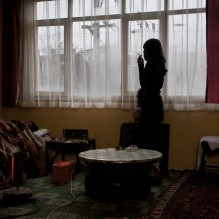
Director F. Serkan Acar hasn’t been an unknown quantity in the film community when he burst onto the festival scene with his first feature-length film Ask ve Devrim (Love and Revolution) last year. Having produced Özcan Alper’s widely acclaimed Sonbahar (Autumn) in 2008, as well as having been the subsequent producer of a Turkish TV series and the co-producer of two other feature-film productions in 2010, Acar has been quite active before his most recent step of once more sitting in the director’s chair – only this time switching from the comparatively modest ambitions of directing short films to a project of much bigger scope. But if ten years ago Acar’s productivity and the topic (as well as the accomplishment) of his feature-length debut might have drawn wide international attention, nowadays all of it seems nothing out of the ordinary in Turkey’s thriving movie scene. Still, with Ask ve Devrim, observant viewers might have witnessed the emergence of not only another gifted Turkish filmmaker in one of the fastest growing film industries of the 21st century, but also of a unique talent with a vision that could be able to catapult him into the first ranks of international festival darlings during the upcoming decade. And with the helpful combination of producer-director, who knows what further impulses Turkish cinema could get from Acar in the future?
Ask ve Devrim reveals a rather thoughtful than ambitious nature in the passionately intimate and intensely subdued visual and aural style Acar is able to impose upon a story of otherwise epic proportions. Dealing with the situation at the beginning of the 1990s, after a decade which was influenced by the military coup of 1980, he tries almost everything to depoliticize and deglamorize his tale of dashed hopes and lost innocence. His hero is a nobody, and the transformation he goes through is the opposite of what one would generally expect from a coming-of-age story. The unremarkable English title of his film is not only plain and truthful but cuts to the heart of things that are the focus of its unrelenting gaze: love and revolution and the way both fuel and obfuscate each other when an unsuspecting youth is subjected to the innermost conflicts and contradictions of his generation.
The brilliant screenplay by M. Serkan Turhan is able to transport the complexity and richness of an individual experience into an allegorical tale of wide-reaching significance without the necessity of resorting to established modes of symbolism or pathos. But the stunning audacity with which Acar sticks to his careful rendition of a country’s turmoiled psyche is what actually makes the film so remarkable. As the film is dressed as primarily a character study, the two main protagonists -“the boy and the girl“ – are the dominating focus of attention, though the girl usually seen through the eyes of the boy. Both young actors who portray them are equally stunning and though it is an achievement of the casting that has paired them together, the directing skills of F. Serkan Acar is what enabled their standout performances. Gün Koper and Deniz Denker have thus both deservedly won an award as most promising male and female newcomers at the 18th International Adana Golden Boll Film Festival in September 2011, where the film also garnered the Special Jury Award. Personally, I wouldn’t have had any reservations in handing them the prizes of the main categories and leaving the newcomer-tag altogether out of the equation.
I won’t bother to go into the details of the rather intricate plot in this review. Suffice it to say that at the center of the film is an unsuspecting youth whose interests in politics are spurned and ignited by his love for a girl from his school. He joins her in the fight for a leftist revolution and becomes more and more involved, taking part not only in organizing and leading demonstrations but also in criminal activities that his superiors believe to be necessary and which he voluntarily carries out. But through all of this Ask ve Devrim is not trying to force a political statement or propagate a solution to the many questions that haunt all of the characters. As one can clearly see, I’m completely enthused by the film and almost every aspect of its creation, and I simply urge you to go and watch the film. I would love to see it again, and am also eagerly anticipating the next work by Acar, as this film is truly a quiet revelation. Like a small current or a big steady stream it carries an intelligence and wisdom that usually only come with age and experience. Ask ve Devrim is honest without being cynical while baring its soul without a grand gesture. It reveals the world in the look of a human being. And in the eyes of the actors there is all you’ll need to know.
